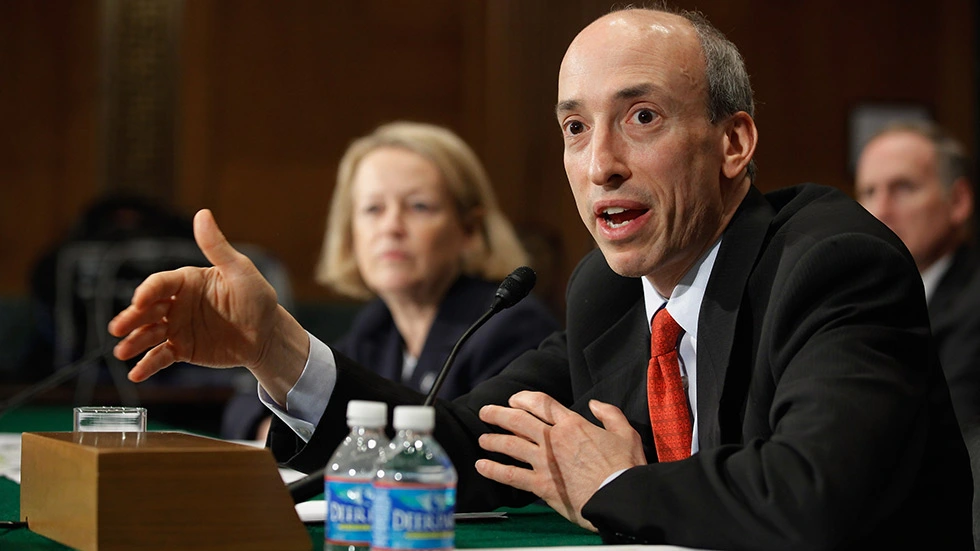The Securities and Exchange Commission (SEC) proposed rules Monday that would force publicly traded companies to reveal the ways climate change could threaten their businesses and their own contributions to global warming.
The SEC voted 3-1 Monday to propose long-awaited standards for how businesses traded on the stock market must reveal to investors the ways climate change affects their financial stability, along with their own roles in the production of greenhouse gasses. SEC Chairman Gary Gensler, a Democrat, along with Democratic Commissioners Allison Lee and Caroline Crenshaw, voted in favor of the rule, while SEC Commissioner Hester Peirce, the agency’s sole Republican, voted against it.
The regulations are open for public comment for 60 days before the SEC can finalize and enforce them, which could take several weeks or months.
Under the proposed rules, publicly traded companies will be required to explain in their regular disclosures to investors how certain climate-related risks can affect their finances. Potential risks include the rising frequency of severe weather, the potential costs of shifting away from fossil fuels and a company’s own efforts to limit its carbon footprint. Companies will be required to calculate these potential costs from data they already compile for regular disclosures to investors.
Companies will also be required to disclose their “Scope 1” emissions — the amount of greenhouse gas emissions they directly produce through their own business operations, such as manufacturing or mining — along with their “Scope 2” emissions, which come from the energy they purchase to keep their business running.
Companies would also be required to report their “Scope 3” greenhouse gas emissions, which include emissions from the goods and services purchased by the firm, if they have set public emissions reduction targets or if those emissions pose a direct financial risk to the business. Firms required to report Scope 3 emissions, however, will not face penalties if they come forward with mistakes or miscalculations in those figures.
The SEC has faced growing pressure from both Washington and Wall Street to set clear climate disclosure standards. Democratic lawmakers and environmentalist groups have pushed financial regulators for years to pay closer attention to the risks climate change poses to the financial system.
Some investment firms have also asked the SEC to set clear guidelines for disclosing climate risks amid rapidly growing investor interest in how businesses handle environmental, social and governance (ESG) issues.
“We have a responsibility to stay firmly focused on facts and science and their implications for financial markets. The pandemic, for example, provided a timely reminder that a crisis from outside financial markets can and often will send shockwaves directly through those same markets,” Lee said.
“With climate change, we have ample, well-documented warning of potentially vast and complex impacts on financial markets. Physical and transition risks from climate change can materialize in financial markets in the form of credit risk, market risk, insurance or hedging risk, operational risk, supply chain risk, reputational risk and liquidity risk.”
The SEC rules are already getting fierce blowback from Republican lawmakers, the fossil fuel industry and businesses likely to face higher regulatory costs and scrutiny.
“This is a thinly-veiled effort to have unelected financial regulators set climate and energy policy for America,” said Sen. Pat Toomey (Pa.), ranking Republican on the Senate Banking Committee, in a Monday statement.
“Forcing publicly-traded companies to gather and report global warming data — almost none of which is material to the business’s finances — extends far beyond the SEC’s mission and expertise.”
Critics of climate disclosure requirements have called them a distraction from the SEC’s core mission of enforcing a broad range of rules that already force businesses to disclose financial risks. Several have also expressed concerns with how feasible it could be to calculate specific risks posed by climate change, and have questioned whether greenhouse gas emissions are an appropriate focus for the SEC.
“With all due respect to my colleagues, society is in big trouble if we’re looking to SEC lawyers, accountants and economists to dictate how companies should address climate change,” Peirce said.
Peirce said the rule “optimistically” assumes businesses will be able to provide consistent, reliable data about the specific financial risks she argued many have struggled to quantify. She also expressed concerns about requiring companies to calculate their secondary greenhouse gas emissions by speculating about the practices of their business partners and customers.
“The desire to bring clarity in an area where there has been a lot of confusion and greenwashing is certainly understandable, but the reason mistakenly assumes that quantification can generate clarity, even when the required data are in large part highly unreliable,” she argued.
The proposal won measured praise from environmental activist groups, who have pushed financial regulators to take aggressive steps to fight climate change.
Lena Moffitt, chief of staff at climate advocacy nonprofit Evergreen Action, called the SEC’s proposal “an important first step to fulfill its mandate to protect investors and capital markets.”
“By setting a clear standard for businesses to disclose data about their greenhouse gas emissions and climate risky assets, this rule will level the playing field and arm investors with vital information to protect their financial futures,” Moffitt said.
Even so, Moffitt argued the SEC should go even further by explicitly defining what qualifies as a Scope 3 emission and eliminating a legal safe harbor for companies that misreport them.
Source: https://thehill.com/policy/finance/599041-sec-proposes-climate-risk-emission-disclosure-rules/

